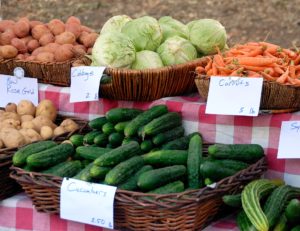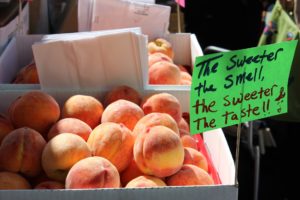Making the Most of Trips to Your Favorite Farmers Market

Spring has finally arrived in Indiana, bringing budding trees and flowers, longer days, and the return of farmers markets. With over 150 farmers markets throughout the state, you are sure to find one near you. Some of the larger markets can be overwhelming to navigate, making it difficult to know if you’re getting the best deals. Here are some tips to help you make the most of out of summer trips to your favorite farmers market.
Before heading to the farmers market, decide on your budget. This will help you prioritize purchases and keep you from overspending. Another way to avoid going over budget is to bring cash. Paying with cash helps you keep track of the amount you’ve spent so you can more easily stick to your budget. And most farmers appreciate exact change and prefer cash.
Don’t forget to bring your own reusable grocery bags. This keeps expenses down for farmers and is better for the environment!
When you first arrive, avoid being overwhelmed with choices by browsing the entire market before making any purchases. See what each farmer is offering, what looks best, and who has the best prices. While you are browsing, talk to the farmers and ask questions about their produce.
 Questions to ask at your local farmers market:
Questions to ask at your local farmers market:
- Where is your farm located? The answer is important if you are interested in purchasing the freshest and most locally grown produce. The term “local” is typically defined as within 100-150 miles of the market.
- Did you grow or raise the produce you’re selling? Sometimes vendors buy wholesale items and resell them as their own. If you would rather purchase from a farmer instead of a wholesaler, this question is an important one to ask.
- What growing practices do you use? Some vendors may be USDA organic certified; however, many others adhere to sustainable practices but do not have the certification. The USDA organic certification is expensive and not always affordable to small-scale farmers. Without a visible USDA organic seal, you’ll have to ask how the farmer handles pests and diseases, especially if you’re interested in avoiding pesticides.
- When was the produce picked? Most farmers pick their produce the morning of the market to ensure peak freshness and maximum nutrition. You may want to pass if the produce was picked more than a day ago, because fruits and vegetables start losing nutrients once they are picked.
- How should I store and prepare my purchases? Farmers generally have great tips on storing and preparing the items they sell. Ask how long different items should last, so you can prioritize eating them. Also ask for recipes and ideas for consuming the items you’re purchasing. For example, ask how to use the greens attached to root veggies like beets and turnips. Did you know that you can eat the leafy green tops of carrots?
Now that you’ve made a round through the market, talked to the farmers, and gotten the answers to your questions, it’s time to purchase the items that appeal to you. As you shop, purchase heavier, larger items first and more delicate and tender items last. This fills your grocery bags in a way that protects your purchases. Be mindful of how much you can consume during the upcoming week. You don’t want your food dollars to go to waste because the produce you purchased spoiled before you could eat all of it.
You may get the best selection if you arrive early, but you may get the best deals if you arrive late.
Farmers don’t like to pack up leftover goods and drive them back to the farm, so they’re likely to offer discounts near closing time. Farmers work long, labor-intensive hours to bring you the best produce they can offer. So while produce at the farmers market may seem more expensive than from the grocery store, you’re getting much fresher, higher-quality produce while supporting local farmers.
 How can you make the most of your next trip to the farmers market?
How can you make the most of your next trip to the farmers market?
Bring cash and reusable grocery bags, browse the entire market before making a purchase, and ask question about the produce you purchase. Get to know the farmers, and ask if they have a mailing list or social media presence to stay connected throughout the season.
If you are in an Indiana 4-H club or are a 4-H club leader in Indiana, consider inviting a farmer that sells at a local farmers market to attend a club meeting, hold a taste testing with locally grown produce, or take a field trip to a farmers market.
If you are interested in more information about farmers markets or other healthy food choices, contact Angie Frost at alfrost@purdue.edu for more information. You can also visit the 4th H podcast website for more helpful healthy tips. Visit our Indiana 4-H Facebook page (@Indiana4H) and tell us how you plan to enjoy the best that summer has to offer from the farmers market!
Don’t forget to “Pledge your health to better living” by making visits to farmers market visits a part of your summer agenda. Get to know the farmers who provide us with amazing local food choices.
Angie Frost is a 4-H Extension Specialist for Purdue Extension and registered dietitian. She leads a team of county Purdue Extension staff, and collaborates with campus specialists and faculty to provide opportunities for Indiana 4-H youth to learn about healthy living.
Arin Weidner is a 4-H Extension Specialist for Purdue Extension. She supports Indiana 4-H programming by creating technology-facilitated curriculum and learning opportunities. She collaborates with Purdue Extension staff and faculty to develop new ideas for learning in 4-H for youth and adults.